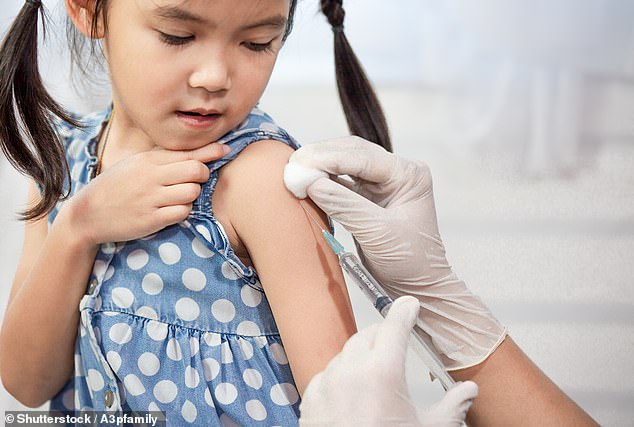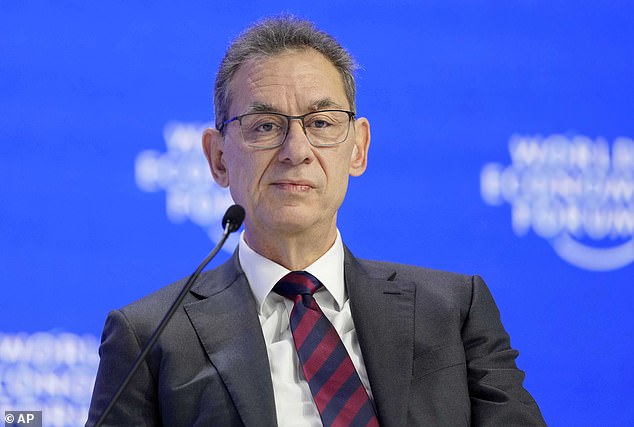- READ MORE: An 8-year-old Indiana boy succumbs to a frightening infection shortly after falling ill.
They are two of the greatest competitors in the pharmaceutical industry.
However, the CEO of a major pharmaceutical company Pfizer has sprung to Moderna ' defense following the Trump administration's choice to reduce its financial support for the development of a bird flu vaccine.
The firm learned that the Health and Human Services Department (HHS) had canceled a $766 million grant provided by the Biden administration to fund development and production. acquisition of its experimental vaccine.
The HHS reported that an investigation determined the project failed to satisfy the necessary scientific criteria and safety requirements for ongoing federal funding. However, some believe this decision may be linked to the new health secretary RFK Jr.'s efforts toward what they perceive as an anti-vaccination platform.
Pfizer Chief Executive Officer Albert Bourla strongly criticized this decision during a conference on Friday, stating that Moderna's latest vaccine, known as mRNA-1018, is "highly vetted and scientifically validated."
Citing the statistic that approximately 1.5 billion mRNA vaccine doses have been administered against Covid-19 Administered globally through his company, Bourla stated that they were likely 'the most widely used vaccines in human history.'
If vaccination rates drop, diseases will likely resurface before too much time passes.
Leveraging the technology developed during the COVID-19 pandemic, mRNA-based vaccines have been explored as potential cancer therapies. With some encouraging initial outcomes.

According to a study from the Pennsylvania State University College of Medicine, researchers observe that "mRNA vaccines represent a compelling and potent therapeutic approach for cancer due to their high efficacy, precision, adaptability, capacity for swift and extensive production, cost-effective manufacture, and overall safety."
Bourla states that Pfizer, which doesn’t depend on government financing and generates most of its revenue through sales and collaborations, will keep investing in vaccine development.
Health and Human Services chief Robert F. Kennedy Jr. has shown significant doubt about vaccines, including the Covid shots —even though concrete examples show they saved millions of lives.
Bourla states that the problem with this and other modifications to U.S. health agency policies is that they "are not grounded in any scientific evidence... They are simply rooted in beliefs."
Even though there is disagreement between the government and pharmaceutical companies regarding vaccines, Bourla states that they share common ground on several issues within the medical field, including cancer research.

"We are striving to tackle these issues while agreeing to differ on the points that separate us," Bourla added regarding the topic.
The mRNA vaccine for avian influenza relies on the same technological approach as Pfizer Pfizer’s and Moderna’s COVID-19 vaccines.
The vaccine includes mRNA that serves as a guide for your body. The cells interpret this mRNA and briefly generate an innocuous part of the avian influenza virus, similar to a decoy.
The immune system identifies this protein as an invader and prepares a defense mechanism against it. Should an individual be subsequently exposed to avian influenza, their immune system will be primed to combat it effectively.
Scientists administered the vaccine to mice and ferrets and noted a robust immune reaction in these creatures.
There were hopes that it would yield similarly positive outcomes in the late-stage trial, but the study has been put on hold.
Despite rising worries over the H5N1 avian influenza strain spreading through U.S. poultry and dairy operations, RFK Jr.'s decision aims at reducing financial support for Moderna’s vaccines.
In the US, at least 70 individuals have fallen ill, with one death reported.
Researchers are concerned that ongoing mutations in the virus might cause it to become more aggressive or transmit more readily among humans, potentially leading to a global outbreak.
In July 2024, Moderna obtained $176 million and was scheduled to get an additional $590 million following approval of the package in January under President Biden’s administration.
The prize scheduled for January was meant to fund an advanced clinical trial that could have assessed the vaccine's effectiveness against pandemic viruses such as avian influenza.
The vaccine had already undergone testing in 300 healthy adults to assess its safety.
A representative from Moderna stated back then: "Although the cessation of funds from HHS introduces some ambiguity, we are satisfied with the strong immune response and favorable safety profile seen in this preliminary assessment."
It remains unclear if Moderna will keep working on its bird flu vaccine without governmental financial support.
In the meantime, Pfizer has achieved a significant advancement with one of its medications named Braftovi.
Although the prescribed medication is typically employed for treating adult skin cancer cases when combined with another drug, a clinical study revealed that it could also extend the survival duration of patients suffering from an aggressive type of colorectal cancer by twice as much when administered as part of their therapy.
The study revealed that cancer patients who were on the medication survived for an average of 30 months, as opposed to 15 months without it.
Bourla emphasized this as a 'highly significant discovery,' particularly since the incidence of colorectal cancer, 'especially amongst young individuals, is currently surging.'
Read more
Post a Comment